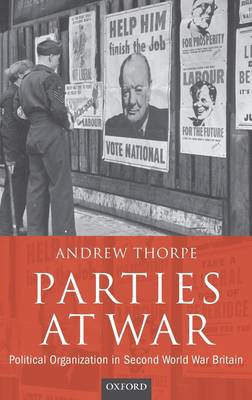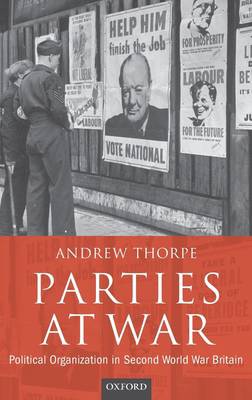
- Retrait gratuit dans votre magasin Club
- 7.000.000 titres dans notre catalogue
- Payer en toute sécurité
- Toujours un magasin près de chez vous
- Retrait gratuit dans votre magasin Club
- 7.000.0000 titres dans notre catalogue
- Payer en toute sécurité
- Toujours un magasin près de chez vous
Parties at War
Political Organization in Second World War Britain
Andrew Thorpe
Livre relié | Anglais
290,45 €
+ 580 points
Description
Political parties formed the cornerstone of the liberal democracy for which Britain claimed it was fighting in the Second World War. However, that conflict represented the most sustained challenge to the British party system during the twentieth century. War forced the suspension of normal electoral politics, and exerted considerable extra demands on the time and loyalties of party activists and organizers. This all posed a serious challenge to the Conservative, Labor and Liberal parties. Parties at War uses an unusually broad and deep range of records of the main political parties to explore how they responded to the challenge of war. Extensive use of the local as well as the national-level papers of the major parties offers a fuller picture than ever previously attempted. Andrew Thorpe focuses on what parties actually did, at both local and national levels, to sustain their organization during the war. He assesses the varying impacts of war, not just on each of the parties, but also over time, and between the different regions and areas of Britain. Thorpe demonstrates how wartime struggles over organization had significance not just for the election of the first majority Labor government in 1945, but also for the longer-term development of "party" in modern British politics.
Spécifications
Parties prenantes
- Auteur(s) :
- Editeur:
Contenu
- Nombre de pages :
- 354
- Langue:
- Anglais
Caractéristiques
- EAN:
- 9780199272730
- Date de parution :
- 28-02-09
- Format:
- Livre relié
- Format numérique:
- Ongenaaid / garenloos gebonden
- Dimensions :
- 157 mm x 234 mm
- Poids :
- 657 g

Les avis
Nous publions uniquement les avis qui respectent les conditions requises. Consultez nos conditions pour les avis.






